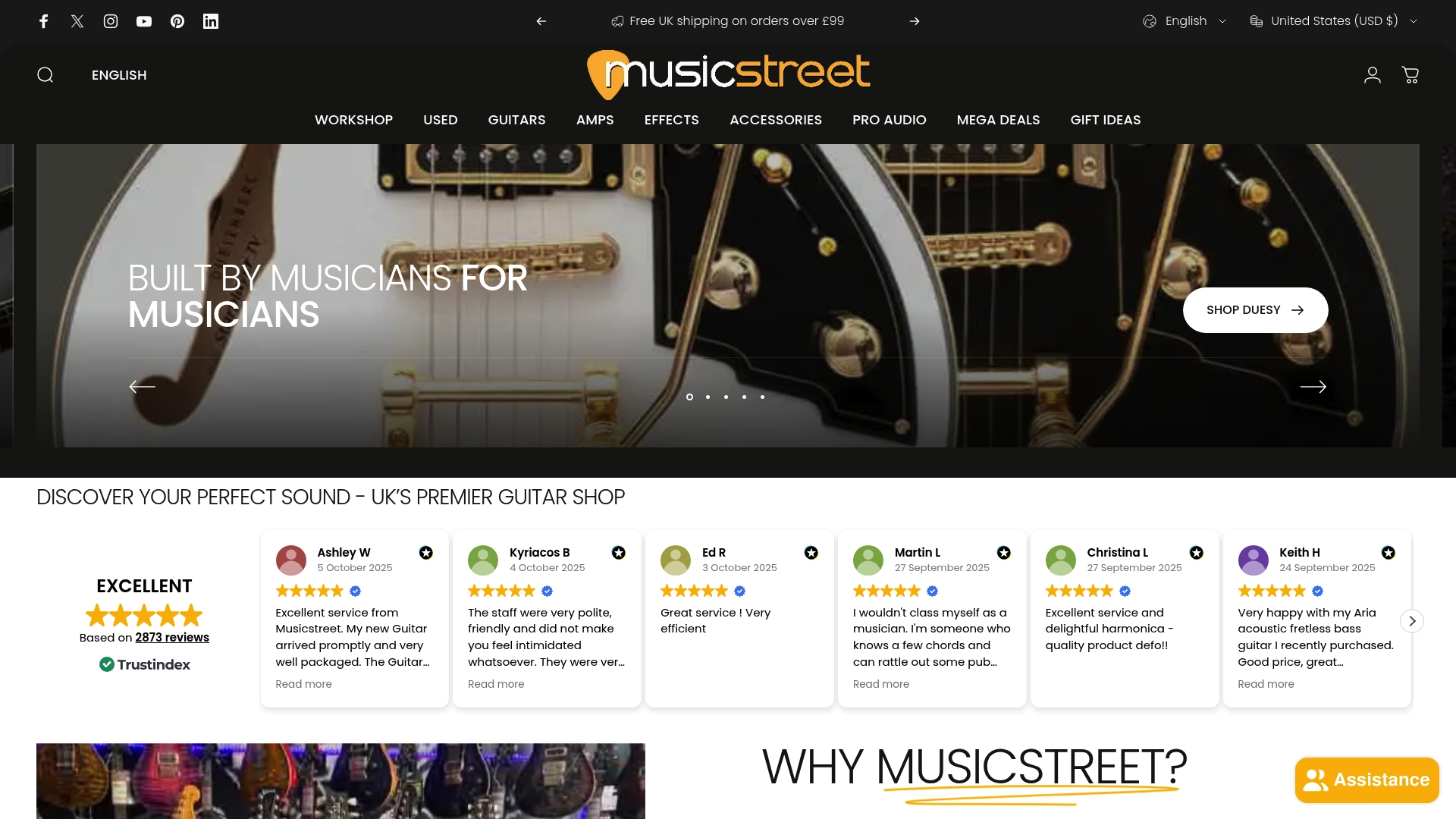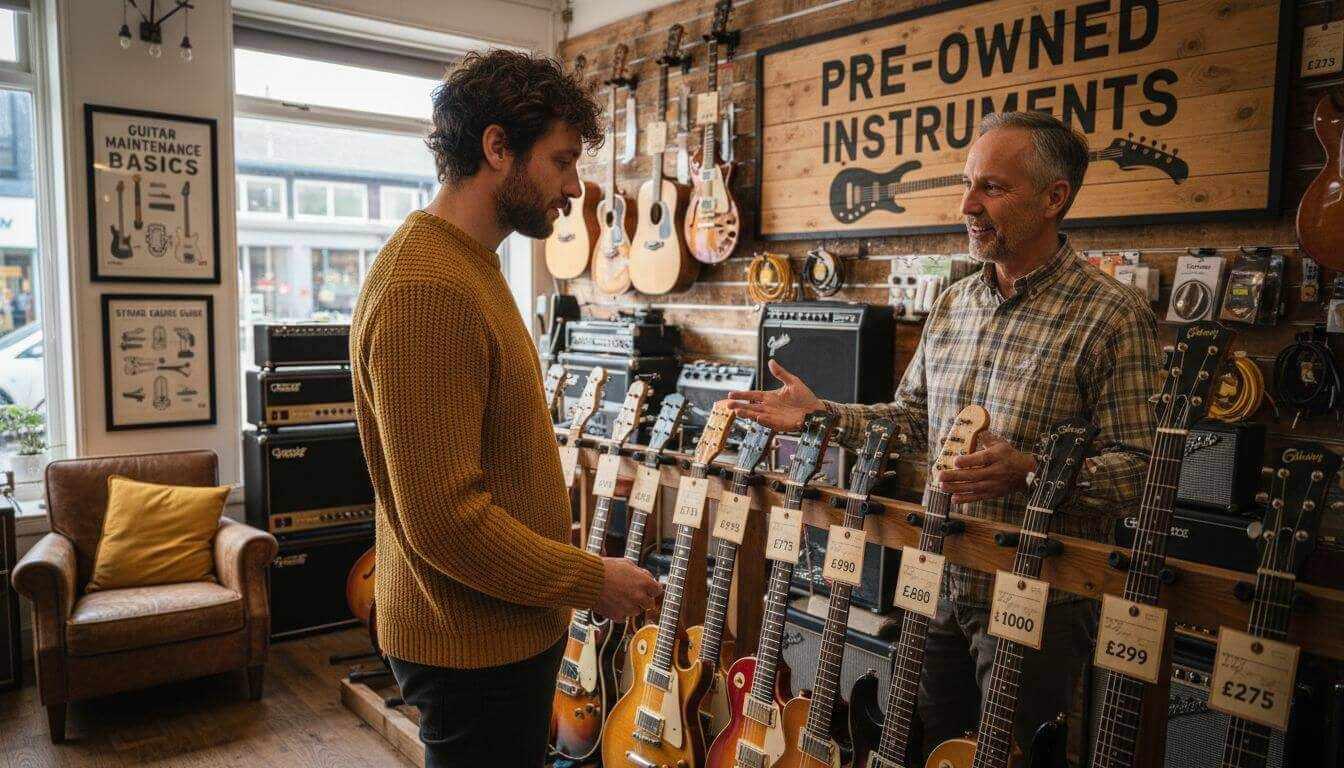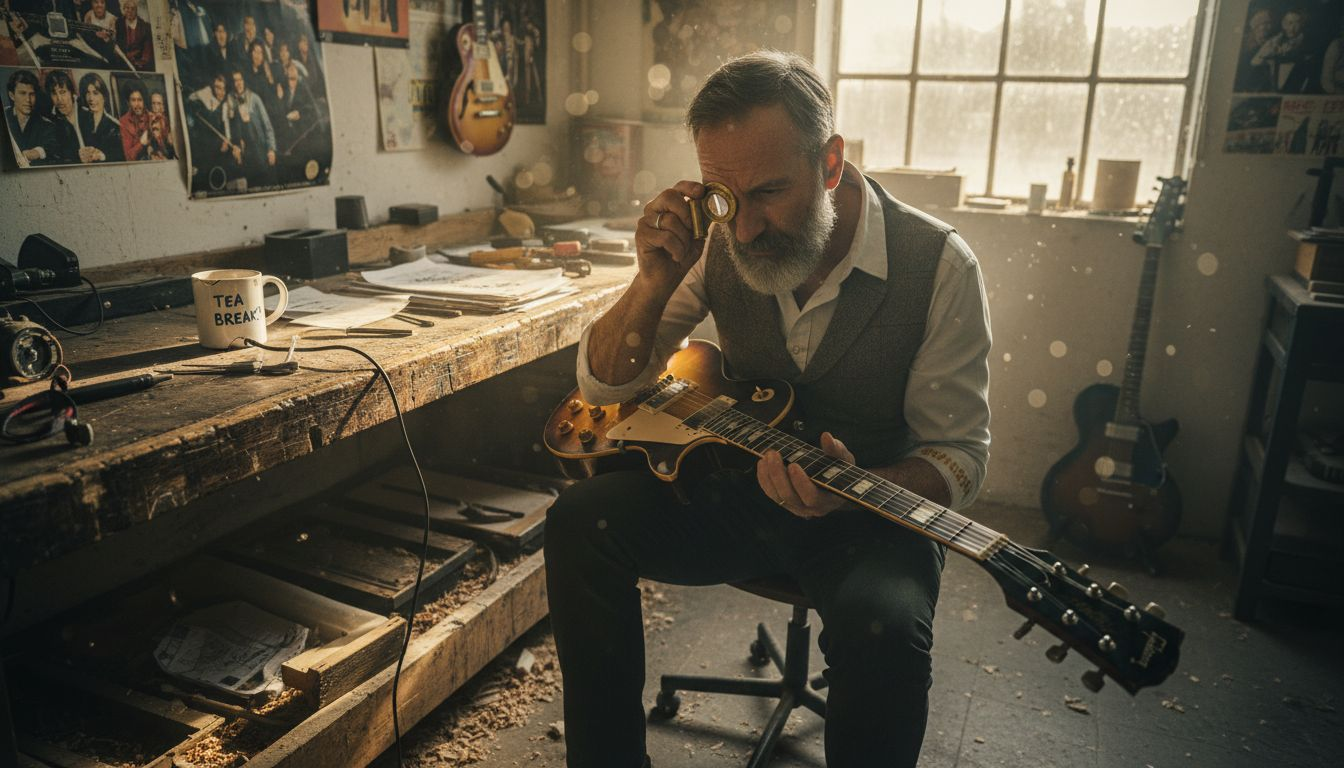Finding the perfect used guitar can feel like a quest where every step matters. For british buyers, the sheer range of options and price points often makes the search more challenging. With most used guitars in the UK selling for £100 to £1000, making the right choice requires clear priorities. This guide shows how to choose wisely by balancing your musical goals, personal budget, and the trustworthiness of sellers so your next guitar truly fits your needs.
Table of Contents
Quick Summary
| Crucial Insight | Clear Explanation |
| 1. Define your needs and budget | Assess your skill level and desired guitar type to set a realistic budget, ranging from £100 to £1000. |
| 2. Research credible sellers | Explore reputable marketplaces and verify sellers through reviews, ensuring quality and transparency. |
| 3. Inspect the guitar thoroughly | Examine the guitar’s physical condition, including neck alignment and structural integrity before buying. |
| 4. Test the instrument’s playability | Play the guitar to evaluate comfort, sound quality, and responsiveness to different techniques before purchasing. |
| 5. Verify authenticity before purchase | Confirm the seller’s credibility, request documentation, and negotiate price to protect your investment. |
Step 1: Assess Your Musical Needs and Budget
Buying a used guitar starts with understanding exactly what you want and how much you can spend. Your musical journey requires careful consideration of your skill level, musical genre, and financial constraints.
Start by evaluating your current playing level and future aspirations. Are you a beginner seeking an affordable first instrument or an experienced musician looking for a specific vintage model? Your budget will significantly influence your choices. According to the makingmusic.org.uk Take it Away scheme, musicians have access to interest-free financing options that can help make instrument purchasing more accessible.
Consider creating a realistic budget range with flexibility. Most used guitars range from £100 to £1000, depending on brand, condition, and rarity. Break down your budget into categories:
-
Entry level (£100-£300)
-
Mid range (£300-£600)
-
Professional grade (£600-£1000)
Remember that your first used guitar should balance affordability with quality. Mastering the art of guitar shopping involves understanding that price does not always guarantee performance. Research thoroughly and be prepared to compromise between your dream instrument and practical financial constraints.
Step 2: Research Trusted Dealers and Listings
Finding a reliable source for used guitars requires strategic research and careful evaluation. Your goal is to connect with reputable sellers who offer transparent, high-quality instruments at fair prices.
Start by exploring specialised marketplaces designed for musicians. reSound offers a next-generation platform that brings together verified sellers of pre-owned musical instruments, providing a trusted environment for buyers. Additionally, Take it Away provides a comprehensive directory of music shops across England and Northern Ireland, helping you locate legitimate retailers both online and in-store.
When researching potential dealers, consider these critical evaluation criteria:
-
Check seller reputation and customer reviews
-
Verify instrument authenticity and condition
-
Understand return and warranty policies
-
Compare prices across multiple platforms
-
Request detailed photographs and condition reports
Remember that a trusted dealer will be transparent about an instrument’s history, provide clear documentation, and welcome your questions. Your diligence in researching sellers can prevent potential disappointment and ensure you find a quality used guitar that meets your musical needs.
Step 3: Inspect and Evaluate Guitar Condition
Carefully inspecting a used guitar requires a systematic approach to ensure you are making a sound investment. Understanding the instrument’s physical condition is crucial before committing to a purchase.
According to the Musicians Union, sellers should be transparent about an instrument’s condition, providing detailed information about any dings, cracks, or structural issues. Musicians Union also recommends that buyers should not hesitate to ask detailed questions and request additional photographs to thoroughly evaluate the guitar.
When inspecting a used guitar, focus on these critical areas:
-
Check the neck for straightness and alignment
-
Examine the fretboard for wear and potential damage
-
Inspect the body for cracks, repairs, or structural issues
-
Test all electronic components if it’s an electric guitar
-
Evaluate the overall finish and cosmetic condition
How to Clean a Guitar for a Spotless, Professional Finish can provide additional insights into assessing a guitar’s overall condition. Remember that minor cosmetic imperfections do not necessarily indicate poor quality, but structural issues can significantly impact the instrument’s playability and value.
Step 4: Test Playability and Sound Quality
Testing a used guitar goes far beyond visual inspection. This crucial step will determine whether the instrument truly meets your musical needs and expectations.
According to the Musicians Union, nothing beats actually playing the instrument to understand its unique characteristics. When testing, focus on several key aspects of playability and sound:
-
Check string action and neck comfort
-
Test intonation across different fretboard positions
-
Evaluate overall tone and sustain
-
Listen for any buzzing or unusual sounds
-
Assess the guitar’s responsiveness to different playing techniques
Complete Guide to Professional Guitar Setups can provide additional insights into understanding an instrument’s potential. Remember that a great used guitar should feel comfortable, sound clear, and inspire you to play. If something feels off during your test, trust your instincts and do not hesitate to ask for adjustments or choose a different instrument.
Step 5: Verify Authenticity and Finalise Your Purchase
The final stage of buying a used guitar involves critical verification steps to protect your investment and ensure you are making a sound purchase. This process requires careful attention to detail and strategic negotiation.
Musicians Union emphasises the importance of verifying seller credibility and ensuring protection against potential damage or loss. Musicians Union also recommends negotiating the price, suggesting buyers can aim for 15-20% off the original asking price.
Key steps to finalise your purchase include:
-
Request original purchase documentation
-
Verify serial number authenticity
-
Obtain a written condition report
-
Discuss warranty or return policy
-
Confirm payment and delivery terms

How to Know If Your Guitar Needs a Setup can help you understand potential future maintenance needs. Trust your instincts throughout the process. If something feels uncertain, do not hesitate to walk away and continue your search for the perfect instrument.
Find Your Perfect Used Guitar with Confidence at MusicStreet
Buying a used guitar comes with many challenges such as assessing condition, verifying authenticity, and finding trusted sellers. If you want to avoid the stress of complicated inspections and negotiations the key is to shop where expertise and quality meet. At MusicStreet.co.uk we specialise in carefully curated used guitars that have been meticulously checked to ensure excellent playability and sound. We understand the importance of balancing budget with quality so you can find an instrument that truly inspires you.

Explore our wide collection of pre-owned guitars where every instrument comes with detailed descriptions and photos to help you make an informed choice. Visit our Physical Store in Huntingdon for hands-on testing and expert advice or shop online with confidence. Don’t wait until uncertainty spoils your musical search – start your journey to owning the perfect used guitar today with MusicStreet.co.uk.
Frequently Asked Questions
How should I assess my musical needs before buying a used guitar?
Start by evaluating your current skill level and future musical aspirations. Determine whether you are a beginner needing an affordable instrument or an advanced player seeking a specific type, and then set a realistic budget reflecting these needs.
What are the key factors to consider when researching sellers of used guitars?
Focus on checking the reputation of the seller, looking for customer reviews, and ensuring the authenticity of the guitar. Also, assess the transparency of their return and warranty policies before making a decision.
How can I effectively inspect the condition of a used guitar?
Examine the neck for straightness, inspect for cracks in the body, and check the fretboard for any signs of wear. Be thorough in your evaluation to ensure that the guitar is structurally sound and suitable for your needs.
What should I look for when testing playability and sound quality?
Play the guitar to assess factors like string action, neck comfort, intonation, and overall tone. Listen for any buzzing sounds and ensure the guitar feels responsive when played, as this will significantly impact your enjoyment and performance.
How can I verify the authenticity of a used guitar before purchase?
Request original purchase documentation, confirm the serial number, and obtain a written condition report from the seller. Negotiating the price and understanding warranty options can also protect your investment.
What steps should I take to create a budget for buying a used guitar?
Break down your budget into categories such as entry level (£100-£300), mid-range (£300-£600), and professional grade (£600-£1000). Ensure your budget is realistic and flexible, balancing quality with affordability.




Share:
Guitar Setup Explained: Optimising Playability and Tone
7 Essential Types of Guitar Bridges Explained for Players